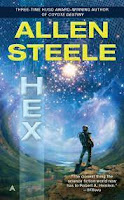After reading more than a thousand sf books and writing reviews, it's impossible not to become a little calloused. Certain patterns, types, and trends reveal themselves, inevitably making the encounter of said patterns, types, and trends less original, less striking. Read ten murder mysteries in space and they can start to lose their flair. Looking to expand his Coyote universe, Allen Steele has written an alien encounter story that, well, hmm, umm, doesn't distinguish itself by much—in context. Let's take a look at Hex (2011).
Hex is the story of members of Coyote's space force, including mother Andromeda Carson and son Sean, who have been given a mission to go to a danui world and there explore the place humans have theoretically been given in the Talus universe. Gearing up as any space crew does, they head off, and to their surprise discover not a planet but an unfathomably massive Dyson sphere. Sorting out where humanity fits in the sphere, however, is subject to some mother-son conflict, as well as some of the alien-human variety.
Hex takes a treeeeeemendous amount of time getting off the ground. The first +/- 100 pages could have been summarized in a page or two, the meat of the story gotten into, surprises revealed, and a bow put on top in a novella length story, all with little lost. Not a good sign. But the larger area of concern is that the story never really takes full flight, either. Things here, things there, moments of potential disaster, some family drama, and a climax that doesn't seem to equal the size of the Dyson sphere encountered. To repeat what's already been stated, it's an alien encounter that does little to distinguish itself. Bumbling figuratively and literally, humanity plays bumper cars when it really needed a rollercoaster.
Is Hex required reading for fans of Steele's Coyote universe? No. The story has little to do with the characters and stories that the series is most known for, not to mention the setting is entirely new... If one stretches their imagination and suspends their disbelief, it's possible to make the argument that Hex acts as a kind of epilogue to the Coyote series. It depicts Coyote in civilized, space faring form, and by doing so hints at the planet's future success. The story features a group of “caveman” humans bumbling about in “civilized” space society, and by doing so likewise intuits humanity will remain humanity, for better and worse—not the worst way to cap off a series . But, as stated, that is stretching things given the lack of substance in other areas...
In the end, Hex is an optional spin-off rather than an organic extension of the Coyote universe. It uses some of the minor pieces of the universe to tell its own, independent tale that can, if stretched, be seen as a quasi-coda. Thus, where the original Coyote trilogy and later duology define the universe, Hex is a side story, unnecessary for casual sf readers but potentially enjoyable for readers enamored by Steele's universe. Take it as such.


No comments:
Post a Comment